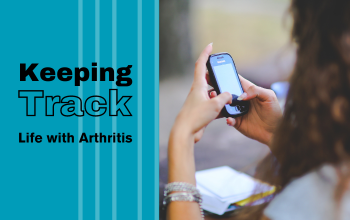The Arthritis Newsletter
Fall 2013E- Health: Friend or Foe to You and Your Doctor?
Written by: Dr. Anne Townsend, Jenny Leese and Gordon Whitehead
 It has been observed that “to be ignorant in the Information Age is a choice and not a circumstance.” Do you agree? And, if it is true that we now enjoy unparalleled access to information, how do we best go about locating and usefully assessing the value and the accuracy of information related to our health? Do you feel overwhelmed by the current wealth of information on the internet; do you think it helps you to better manage your health? Have you had the experience of visiting your doctor armed with information obtained from the internet? How was that received? Conversely, are you sometimes hesitant about appearing “too knowledgeable” to your doctor, out of a concern that this may be taken amiss?
It has been observed that “to be ignorant in the Information Age is a choice and not a circumstance.” Do you agree? And, if it is true that we now enjoy unparalleled access to information, how do we best go about locating and usefully assessing the value and the accuracy of information related to our health? Do you feel overwhelmed by the current wealth of information on the internet; do you think it helps you to better manage your health? Have you had the experience of visiting your doctor armed with information obtained from the internet? How was that received? Conversely, are you sometimes hesitant about appearing “too knowledgeable” to your doctor, out of a concern that this may be taken amiss?
These are some of the types of questions that a group of researchers at the Arthritis Research Centre of Canada and two patient co-investigators are exploring.
E-health is one of those terms that now seems to be everywhere. It has a wide range of meanings, but researchers at the Arthritis Research Centre of Canada (ARC) see it as the use of technology for health purposes. Prof. Catherine Backman and Dr. Anne Townsend at ARC are working with researchers to investigate how people with inflammatory arthritis, doctors and other health care providers (HCP) use e-health, and how these new technologies influence patient/consumer health and healthcare. Focus group discussions explored general issues about e-health from the perspective of consumers and HCPs. Recruitment is now underway – to interview consumers and HCPs about what types of e-health they use and find out more details about their views and experiences of the positive and negative aspects of e-health.
E-health: a revolution in healthcare?

E-Health Ethics Event:
A conversation about the potential perils and benefits of internet health resources and apps. Can they change lives?
| DATE: | Saturday November 30, 2013 |
| TIME: | 10:00AM – 12:30PM |
| VENUE: | Blusson Spinal Cord Centre 818 West 10th Avenue |
For information and to register: ROAR Email: ehealth@arthritisresearch.ca
or call 604-207-4006.
![]()
Earlier this year, the Canadian government announced an investment of $2.1 billion to increase the availability of e-health technologies, viewing them as ‘an essential enabler of health care in Canada’. In British Columbia alone, a handful of new companies are advancing technologies to improve access to health services and the efficiency of the healthcare system.
Using apps to monitor diet and exercise, Dr. Google to help with a diagnosis, and blogs and support groups to share experiences are just some of the ways that new technology is changing the way we manage our health and illness. Online conversations about these new technologies and healthcare are being hosted on Twitter weekly (under hashtag #hcsmca).
As e-health develops the voice of patients is getting louder – ‘epatient Dave’ is one example of an increasing number of consumers/patients who have an online presence and are affecting decisions about health care. This new type of patient with access to not only information but also opportunities to have their priorities heard and discussed has prompted the prominent sociologist Deborah Lupton to talk about a ‘digitally engaged patient’ taking more control in their health care. E-health, it seems, provides a gateway to becoming a more active ‘partner in care’ who works with her/his health care team.
It is often claimed that this ‘explosion of e-health’ is nothing short of a revolution in health care, but little is known about the advantages and challenges that this rapid change may present. In particular, we don’t know enough about the ethical issues – i.e. the potential benefits and harms – that will arise.
Identifying the benefits & harms of e-health: a question of ethics
When compared with other industries, the healthcare sector has been slow to adopt digital media technologies. Policies are not always up-to-date to guide the use of e-health as decision-makers struggle to keep up with the pace of technology.
Concerns around maintaining confidentiality and boundaries are common, and other potential harms exist, like the risk of miscommunication and changing professional responsibilities.
Take this scenario from the College of Occupational Therapists of Ontario’s recently released e-learning module for health professionals, for example:
A patient, who regularly sees a health professional for routine blood work mentions casually to the professional that he is now being treated for depression and is not pleased with the care he is currently receiving. The professional refers the patient to a blog with information about depression. While reading the blog, the patient notices that the information on the site has not been updated in three years and most of the projects and counseling services referenced are only available in the United States.
What is the professional responsibility of the health professional to ensure the information recommended to the patient is current and accurate?
How can e-health benefit patients/consumers?
What are the downsides of e-health for patients/consumers, for HCPs and for the Canadian health care system?
How far can e-health improve the quality of health care?
Can e-health protect/promote what we most value about health care?
How can e-health help patients to become captains of their health care team if this is what they want?
These are some of the ethical questions that ARC’s E-health Ethics study is tackling. Findings will provide valuable insight into these issues for the benefit of decision-makers (including patients, health professionals and policy-makers) invested in arthritis care.





















































